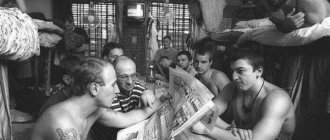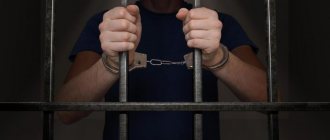Prison castes (“suits”)
- those who are classified as professional criminals. Next come the “criminals” (close to the “criminals”) and the “third table” (close to the “criminals”). The most numerous category of camp inmates are “boys”. This is the name given to guys who have committed the first crime in their lives and are determined to return to normal life after serving time. They do not violate the rules established by the "thieves", they do not cooperate with the administration, but, as a rule, they do not aspire to join the "thieves". Each representative of these castes can rise to the highest “suit”. Representatives of lower castes will never get such a promotion. These castes include: “forshmak” (those who committed an offense out of ignorance), “shortcutters” (always hungry, hiding bread in their pockets, finishing off pieces of food for their comrades, etc.), “shnyri” (servants), “goats” (informers ), “roosters” (passive homosexuals). However, each colony has its own variations of names and rules established for all “suits”. Perhaps, the status and names of only three “suits” remain unshakable: “thieves”, “boys” and “roosters”.
Characteristics of correctional colonies
In Russia, the Federal Penitentiary Service administers 62 correctional colonies for minors, located in 54 regions. Most of them are colonies for boys, and in the Belgorod region there is a colony for minor girls and the same in the Tomsk region.
Here's what the statistics look like on the types of crimes committed by minors:
- 16% were convicted of theft.
- About 15% of convicts are serving sentences for robbery.
- Intentional injury to health – 11%.
- Kills - 10%.
- About 8% are convicted of rape, and the rest is occupied by other crimes.
The order of production in "suit"
Each new arrival is given a “registration” in order to find out the moral qualities and status of the person. There is a rule: no admission tests can be given to a person until all the norms of behavior and traditions of the zone are explained to him. In the “youngster” zones, the tests look, according to the descriptions of experienced “inmates,” on the one hand, like an initiation ritual that exists in various primitive tribes, on the other, like an extremely cruel, but still a game. The subject is asked questions based on his wits. For example: “Why does Zhukov ride a white horse?” Correct answer: "On the ground." He may be forced to jump from the top tier of a bunk upside down to test how brave he is. If he decides to jump, his comrades will have time to stretch the blanket. Information about the newcomer received “from the outside,” his “track record,” so to speak, is also of great importance. If it becomes known that the newcomer was once “omitted,” then the most brilliant passage of “registration” will not help him. If an experienced “thieves” turns out to be in the cell, then registration is not required, honor and respect are guaranteed as is. However, any representative of the “higher castes” should keep their ears open so as not to be “let down.” It is not only the one with whom sexual intercourse was performed that is considered “lowered”; they can be “lowered” by splashing urine or touching the skin with the genital organ. In addition, you can fall into the category of “roosters” simply by unknowingly sitting at the same table with them, and even... mending your socks. The teacher can also lower him, on purpose, as a form of punishment, transferring him from a prestigious sleeping place to “devils” or “goats”, and even worse - to “roosters”.
What is the difference between the conditions of detention?
If minors are serving their sentences in colonies on preferential terms, they live in special dormitories. Everyone has their own account in which money is stored, and they can use it unlimitedly. For such teenagers, short visits are allowed at any time. During the year they are allowed to take long visits, during which they are even allowed to live outside the territory of the colony.
There are cases when minors held on preferential terms are allowed to live outside the institution, but only under the supervision of the administration. Teenagers are then allowed to use cash and wear regular clothes.
If a child is kept in easier conditions, then he lives in a dormitory and can buy food, but the amount is limited to 7 minimum wages. During the year, short visits are allowed every month, and long visits are allowed once a quarter.
Normal conditions of detention include living in dormitories and spending up to 5 minimum wages on food purchases. There are only 8 short dates during the year, and 4 long ones.
Strict conditions are intended for the detention of persistent troublemakers or those who find themselves in such an institution not for the first time. The conditions, of course, are radically different from others. Teenagers live in separate rooms, which are locked if the convicts are not busy with work or study. They can spend only 3 minimum wages per month, long visits are not allowed at all, and only 6 short ones per year.
Considering the current insufficient funding for such institutions, it can be noted that it is not always possible to transfer a teenager to preferential conditions of detention before his release. And this period is considered quite important; it allows the child to adapt to living conditions in freedom.
Just like from prison, you can leave the colony early. If the crime committed by a teenager is classified as moderate or not at all serious, then with good behavior and compliance with the regime, the convict can go home after serving a third of his sentence. For serious offenses, they can be released early only after 2/3 of the term has passed.
A children's colony for minors involves attracting teenagers to work. The length of the working day depends on the age of the convicted person. Any work is prohibited at night, as well as on weekends.
Accommodation, food and clothing are provided to convicts at the expense of the state. At least 50% of the earned funds must be transferred to the personal account of each minor every month.
What is considered “bad” in the “youngsters”
In the zones where juvenile offenders are kept, there are a lot of different “taboos”, the violation of which threatens immediate punishment. Even the prisoners themselves don’t always know why this or that action cannot be performed, but there is only one answer: it’s a shame to do it. So, it's better not to take risks. So, it’s a shame to pick up fallen objects from the floor, especially a toothbrush and cigarettes. It is absolutely forbidden to lift soap in the bathhouse. It’s categorically “bad” not to wash your hands after using the toilet, and the point here is not only about hygiene, but also about the fact that the hand that touched the genitals becomes, as it were, “ritually unclean,” desecrating everything it touches. In the bathhouse you should use two washcloths, one to wash the body above the waist, the other below. The “thieves” eat black bread with tea, and especially dry bread. By the way, “youngsters” amaze with a number of strange “food taboos”. So, you can’t eat sausage, it looks like a man’s penis. Lard too, since the pig was “paraffinized” (impregnated) with the smell of sewage, the bread is raised by communists, so it is also “bad”, the chicken was trampled by the rooster, and so on. Of course, these rules were not followed everywhere and not always, but sometimes they served as a reason for finding fault with the person they intended to “put down.” In some colonies, young prisoners refuse to eat barley porridge, since chaff is “rooster food,” and cabbage is “goat food.” While eating, you need to make sure that the last spoon does not touch the bottom of the plate; there should always be something left at the bottom, otherwise they will be considered “not enough” (aka “gut fornication”). And finally, “zapadlo” is everything that is red. Red is the color of Soviet power, and power is the enemy of all “thieves” and “right boys.” Not a single correct convict in the “youngster” will ever pick up a red object in his hands. You couldn’t even smoke Prima cigarettes, because they came in a red pack. If someone’s mother comes on a date wearing a red jacket or a red scarf, the prisoner is obliged to refuse the date. However, after 1991 this taboo disappeared along with the “red power”.
Why can a teenager end up in a correctional facility?
Who is at risk of juvenile detention? At what age can you be outside its walls? If you study the law, you will see information there that criminal liability in our country begins at the age of 16, but there is also a clause that names the categories of crimes for which you can be sent to such an institution from the age of 14:
- Kidnapping.
- Committing robberies and thefts.
- Robbery attack.
- Car theft.
- When harm to human health is intentionally caused.
- Rape or any other sexual assault.
- Involvement in terrorism.
- Hostage taking.
Quite often lately, teenagers have committed acts of vandalism, damage or destruction of cultural property. For such offenses, the child also ends up in a correctional facility.
There are also some crimes that teenagers are often caught committing, but somehow you don’t want to associate them with a young age:
- Purchasing and carrying explosives.
- Manufacturing and marketing of explosive devices.
- Weapon theft.
- Extortion.
- Distribution and theft of narcotic substances.
We can say that quite a lot of crimes committed by minors will not go unpunished, only often teenagers do not even suspect this, that they will have to answer for the illegal actions committed.
I was talking about airplanes
If the above-mentioned traditions and taboos have at least some explanation, then there were customs among the “youngsters” that did not lend themselves to any interpretation at all. These oddities can be explained only by one thing: they were born from senseless and cruel, but childish games. How, other than a game, can one explain such a custom, for example: a new arrival in the zone on the evening of the first day had to climb onto the bars and shout: “Prison, prison, give me a chase, but not a simple one, but a thieves’ one!” So the newcomer hung on the grid until he was given a nickname. At the same time, it was necessary to be on guard, since they could offer, for example, the sonorous word “quantus” as a nickname. Out of ignorance, the newcomer agreed, and thus became the bearer of a nickname meaning a stick for cleaning a latrine. Even more senseless was this custom: if a plane flies by, you had to immediately hide under the table, and in other colonies, you also had to put a bowl on your head, no matter whether there was still gruel there or not. The plane also became a problem for those who went to relieve themselves. If the need was great, then you had to stay in the toilet until another plane flew over. Knowledgeable people made an airplane out of paper, launched it, and this served as permission to get off the shock. Most of these customs and taboos existed in the colonies in the 70s and 80s. Nowadays, the etiquette of “youngsters” has become somewhat simpler.
Show comments
Discussion
Conditions of detention in correctional colonies
Juvenile correctional colonies differ from prisons in that they have several different conditions of detention:
- Preferential.
- Strict.
- Lightweight.
Immediately after a juvenile offender crosses the threshold of the colony, he is kept under normal conditions. But this only applies to those who committed a crime for the first time. The convicted teenager is monitored for three months. If during this time he does not commit any offenses and behaves well, then he will be transferred to lighter conditions of detention.
Those who, from the very first days of their stay in the colony, violate the regime and conflict, face a completely different attitude. They are placed in strict detention conditions.
Before release, those who were held in lighter conditions are transferred to preferential conditions. But sometimes it happens that teenagers, overjoyed that they are going home soon, begin to violate the regime, and in this situation they are threatened with transfer to strict conditions of detention.
The head of the colony himself is responsible for transferring from one condition to another.
Kids in a cage
From time to time there were accusations that the program was staged - adult prisoners were too recklessly lashing out at teenagers, and often for no apparent reason. But the producers assured that everything was for real. However, there is nothing surprising in the behavior of prisoners, given the accumulated aggression and poor leisure time. Shapiro assured that the children who are attacked by criminals are fine: the readiness of the show participants for massive pressure was determined by a special commission of psychologists, which assessed whether the teenager was able to endure the ordeal of prison.
The show aired for five years, and they never found a handle on it. Filming of “Beyond Scared Straight” stopped for natural reasons - after nine seasons, the ratings dropped noticeably. But the A&E network, which aired the show, from time to time refreshes the interest of viewers and sometimes releases sequels about how the lives of the show participants turned out after prison.
Beyond Scared Straight is far from the only show about life behind bars. Long before him, in 2007, the United States was shocked by the reality show “Lockup” about the everyday life of colonies, and just recently, in the spring of 2018, Netflix launched a series about a women’s juvenile detention center. These are confessional projects, like the first “Scared Straight” was back in 1978, an exploration of the human soul, catharsis through suffering. Although Beyond Scared Straight was not such a thing, it sparked an important public debate: where is the acceptable line in an experiment on human consciousness and why is it necessary if the intended effect will overwhelm all attempts to rehabilitate the little bandits peacefully?
The author of the experiment is convinced that his project has made America better. Shapiro, in his own words, feels like a “teacher without a classroom,” who educates people without having to lecture. What exactly he taught the Americans is difficult to say, because juvenile delinquency is still a sore point in America.
"I would jump on you like a kangaroo"
In 1978, aspiring Los Angeles director Arnold Shapiro shocked Americans. He gathered a group of juvenile delinquents and took them to prison to bring them together with real prisoners who had committed serious crimes.
The inmates tried so hard to explain to the young offenders that they had chosen the wrong path that they almost overdid it. They screamed in the young people's faces, spoke crudely about prison atrocities, and grabbed them, demonstrating that there was no such thing as personal space in prison. The guys were afraid of inevitable rapes. “If you were in my cell, I would jump on you like a kangaroo,” the heated prisoner shouted to one of the young guests.
The emotional sermons of the criminals made an indelible impression on the children and convinced them to stay away from prison. They talked about this several decades later, when documentarians visited them again. Many turned off the slippery slope, found work, and started families. And years later they met the very same prisoners who taught them a lesson for life.
The film “Scared Straight” (“Scared, for sure!”) won an Oscar and made its heroes and creators celebrities. One of them was Peter Falk, the legendary Lt. Columbo from the series of the same name, who by 1978 was already a superstar with two Golden Globes to his name. Falk produced Shapiro's film and even appeared in the film.
Frame: the film “Scared, for sure!”
The film started with great ratings. But Shapiro believes that the main merit of the film is that communication with criminals made the young heroes of the film human. “I’m most proud of the fact that the film saved lives,” the director said. “I have a lot of letters from people who say they would be dead or in prison if they hadn’t seen Scared Straight.”
Having achieved worldwide fame through other documentary projects, as well as the series 911 and Big Brother, Shapiro decided to continue the experiment with deviant children and developed Scared Straight into a reality show. In 2011, “Beyond Scared Straight” was launched - about teenagers who have broken the law and are now sent for re-education to a colony where seasoned prisoners are serving their sentences. There, they don’t stand on ceremony with recruits, regardless of age and gender. In the lair of criminals, teenagers are harshly pressed in the worst traditions of the American zone. They are pressed against the wall, they are spoken to exclusively as nonentities and only with obscenities, they are locked in dirty toilets, their faces are shoved into the toilet, they are humiliated in all available ways, they are threatened with beating, rape and murder. And they even try to make some promises come true, but they are stopped in time by the correctional service officers.
They do not treat minor offenders with delicacy - this is the main feature of the project. Its authors did not care about therapeutic methods of correcting young prisoners; they were in favor of spectacular hardcore that breaks the psyche. Endless humiliation and threats of physical violence are the main methods of correcting teenagers who have stumbled. There is nothing you can do to keep growing members of society away from prison. Unless you kill him.
Deny cannot be shown
The very first episodes of reality shocked the progressive American public, especially that part of it that devoted its life to pedagogy and protecting children's rights. The first to speak loudly was a juvenile justice activist with more than 20 years of experience, Joe Vignati, a recognized expert on juvenile justice issues in 50 American states. Vignati accused the show's creators of irresponsibility and called for it to be canceled because it could cause more harm than good. It was not only about the participants in the TV show, from whom the fire was knocked out with a wedge, but also about the teenagers on the other side of the screens, moreover, about their parents too.
The expert cited as an example numerous studies proving that intimidation is not only inhumane, but also simply ineffective as a fight against deviant behavior: aggression breeds aggression, and pressure breeds a thirst for revenge. In addition, viewers who empathize with the main characters who endure constant humiliation, cry, but cannot escape from this trap, and feel nothing except hatred for the prisoners who are pressing them. In addition, parents who do not have sufficient pedagogical knowledge from among the viewers of this show may believe that force is the only sure way to influence uncontrollable children, but this is not the case, experts insisted. As a result, all parties to this conflict only increase the chances of a difficult teenager to end up in prison. From this perspective, Beyond Scared Straight reads like a prison survival manual.
“Don't smile at another person in prison, because if you smile at someone here, it makes them think that you like them and that there is something wrong with you,” 50-year-old yells in the face of one recruit at a Maryland prison. year old man convicted of first degree murder. Later, the same hero will get it from another prisoner, whom he had the imprudence to look at while standing at the urinal. “How do you like this offer? A grown man looking at someone else's ass! Do you want someone to look in your ass?” - a 35-year-old prisoner serving a life sentence for armed robbery and attempted murder shouted at him at the top of his lungs.
Fragment of the show
Similar conclusions were reached by Collaboration Campbell, a non-profit structure designed to fight for social justice. The conclusions of its experts about the dangers of the television show were quoted by all federal officials who vehemently prevented its broadcast. Experts concluded that the show's underage participants "suffered more from fear than they gained any benefit."
Many prominent psychologists and human rights activists joined the “Beyond Scared Straight” containment campaign. Venerable expert on juvenile affairs John Wilson expressed hope that the authors of the project will nevertheless study the facts, come to their senses and close the criminogenic show. Partial government funding of the program, which was perceived by critics as anti-state, also added fuel to the fire.
“Beyond Scared Straight is a failed program that does more harm than good,” Wilson said. However, the authors of the reality show, which received stunning ratings after each release, had a different opinion on this matter. Shapiro would probably be a bad producer (by industry standards) if he didn't continue producing the show that got everyone so excited. These are the laws of hype that ratings are subject to.
Due to a flurry of complaints in some regions, the broadcast of the program was suspended and each episode was watched, but nothing violating the law was found and it was sent on air. Shapiro believed that this was direct evidence that criticism and media hype were just empty barking of spiteful critics. He claimed that he had not seen a single study that would confirm the harm of Scared Straight and remained confident that the project helps children dissect their own feelings and emotions, overcome negativity and heal.
Especially for Shapiro, who never held in his hands an analysis of the harmfulness of his television show, and for other dissenters, scientists conducted a study proving this harm. Not a single attack on “Dom-2” had such thorough preparation - take at least ten studies from the Washington Institute of Public Policy (WSIPP), which refuted the effectiveness of the “Scared Straight” methods. Scientists have recognized that the program only increases the likelihood that its participants will commit a crime. “This is the only program we looked at that actually increases crime,” said WSIPP senior scientist Elizabeth Drake. But the producer skillfully retorted: scientific work is untenable, since his reality was studied on a par with shows that no longer air.







